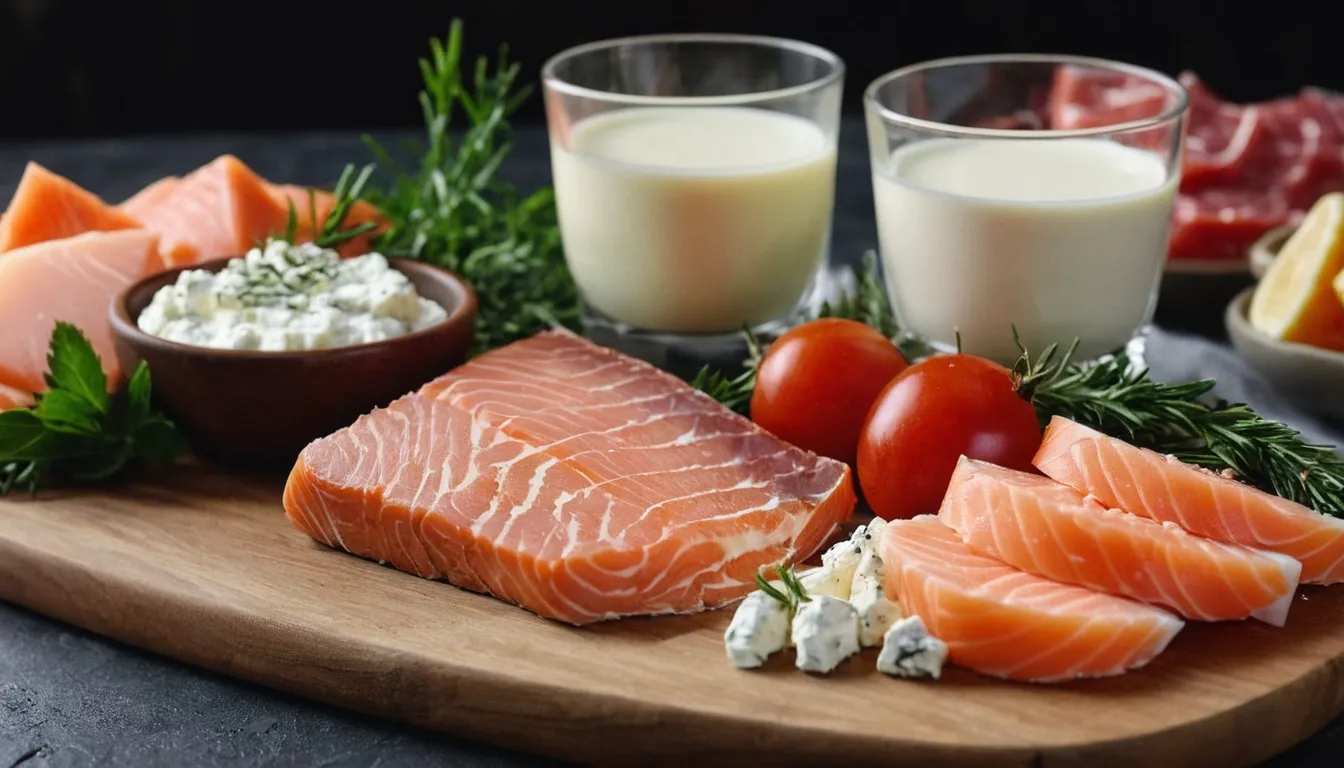
C15:0 – The Fatty Acid You Didn’t Know You Needed
Is C15:0 the next essential fatty acid? Explore its unique role in metabolic health, anti-aging, and inflammation regulation with natural food sources and expert insights.
C15:0, also known as pentadecanoic acid, is a saturated fatty acid that has recently emerged as a potential "essential fatty acid" for its role in promoting overall health. While saturated fats have often been vilified, C15:0 challenges the narrative by demonstrating unique health benefits that set it apart from other saturated fats.
What Is C15:0?
C15:0, or pentadecanoic acid, is a naturally occurring saturated fatty acid found in foods like full-fat dairy, certain fish, and grass-fed meats. Unlike omega-3 and omega-6 fatty acids, C15:0 is a saturated fat with fully "saturated" carbon chains, making it highly stable and effective at strengthening cell membranes, reducing inflammation, and supporting metabolic health. Emerging research suggests C15:0 may be considered an "essential fatty acid," as our bodies need it but cannot produce sufficient amounts independently.
Once consumed, C15:0 is metabolized into pentadecanoylcarnitine, a bioactive compound with powerful anti-inflammatory effects. This metabolite works by interacting with key receptors in the body: cannabinoid receptors (CB1 and CB2) to regulate inflammation, immune responses, and pain; serotonin receptors (5-HT1A and 5-HT1B) to manage mood and pain; and histamine receptors (H1 and H2) to reduce allergic and inflammatory reactions. These interactions make C15:0 and pentadecanoylcarnitine effective in addressing conditions related to the heart, immune system, lungs, skin, and even cancer.
Higher dietary intake and circulating levels of C15:0 have been linked to lower risks of chronic diseases, including heart disease, heart failure, and type 2 diabetes, as well as increased longevity. Studies show that pentadecanoylcarnitine specifically reduces markers of inflammation, such as IL-1α, ITAC, MCP-1, and IP-10, which are associated with cardiovascular disease, autoimmune disorders, cancer progression, and pulmonary inflammation. By stabilizing cell membranes and targeting critical biological pathways, C15:0 and its derivative offer substantial promise for improving health outcomes across a wide range of chronic conditions.
How Important Is C15:0 Compared to Essential Fatty Acids?
C15:0 differs from traditional essential fatty acids (EFAs) like omega-3 and omega-6 in its function and effects. While EFAs are crucial for building cell membranes and regulating inflammation, C15:0 plays a complementary role by enhancing cell membrane integrity, reducing oxidative stress, and modulating inflammatory responses.
Unique Benefits of C15:0:
- Cellular Health: C15:0 strengthens cell membranes, making them more resilient to damage over time.
- Anti-Inflammatory Properties: It has shown the ability to regulate inflammation, particularly in chronic conditions.
- Metabolic Regulation: Studies suggest C15:0 can improve metabolic health by supporting lipid metabolism and glucose regulation.
In essence, C15:0 doesn't replace omega fatty acids but works alongside them to promote overall wellness.
How Much C15:0 Do Humans Need?
While there is no established recommended daily intake for C15:0, studies suggest that even small amounts can have measurable effects. Most people naturally obtain C15:0 through their diet, but modern dietary trends—such as reduced consumption of full-fat dairy and animal fats—might result in lower-than-optimal levels.
In studies on humans and animals, diets that included small, consistent amounts of C15:0 improved metabolic markers, inflammation, and even markers of aging. While more research is needed to determine precise guidelines, incorporating foods rich in C15:0 into your diet could provide significant benefits.

Where Can You Find C15:0?
C15:0 occurs naturally in small amounts in various foods, including:
- Dairy Products
Full-fat dairy, including butter, cream, and cheeses (like goat and sheep cheese), are rich sources of C15:0. Goat and sheep cheese, in particular, contain high-quality fats that contribute to overall lipid metabolism. - Fatty Fish
Fish like salmon and mackerel provide not just omega fatty acids but also small amounts of C15:0. - Certain Plant-Based Oils
Coconut oil and palm kernel oil contain trace amounts of C15:0, though they are primarily sources of other saturated fats. - Meat
Grass-fed meats tend to have higher levels of C15:0 compared to grain-fed alternatives. - Human Breast Milk
Interestingly, human breast milk contains C15:0, further emphasizing its biological importance.
Supplements and Products for C15:0 Support
For those looking to incorporate C15:0 (pentadecanoic acid) into their health routine, several supplements and related products on Amazon offer direct or complementary support. Below are five products that stand out for their quality and value.
- Fatty15
Fatty15 is a pure, vegan-friendly C15:0 supplement backed by science and designed to support long-term health. It’s formulated to promote cellular health, balanced immunity, and improved metabolism. Users have reported benefits such as calmer moods, deeper sleep, and reduced cravings within just six weeks. This supplement is ideal for anyone looking for a simple, effective way to boost their C15:0 intake. - Ancestral Supplements Grass-Fed Beef Liver Capsules
While not a direct source of C15:0, these capsules are packed with nutrients that support overall health, including energy production, detoxification, and immune function. Made from non-GMO, freeze-dried liver, they complement a diet rich in C15:0 by providing additional health-boosting micronutrients. - Pecorino Romano
A premium Italian import, Locatelli offers a distinctive flavor profile. Its high-quality production ensures a rich source of C15:0. - Fiore Sardo PDO
This authentic Sardinian cheese offers a robust flavor, perfect for grating over pasta or enjoying with fruits or salads. Its rich fat content makes it a valuable source of C15:0.
Incorporating these products into your routine can help you enhance the benefits of C15:0, whether you’re aiming to improve cellular health, regulate inflammation, or boost metabolic function. Always look for products with high ingredient quality and third-party testing to ensure safety and effectiveness.
The Discovery of C15:0
C15:0 gained attention during lipidomics research in the early 2000s, but its potential as a beneficial fatty acid was highlighted in 2020 by researchers investigating its effects on aging, inflammation, and metabolic health. In one study published in Nature Scientific Reports, C15:0 was shown to restore cell membrane stability, reduce inflammation, and improve mitochondrial function. These findings have spurred ongoing investigations into its use as a dietary supplement and therapeutic agent.
How to Incorporate C15:0 into Your Diet
You don’t need to overhaul your entire diet to include C15:0. Focus on integrating these foods into your meals:
- Goat and Sheep Cheese: Pair with salads or enjoy as a snack for a delicious source of C15:0.
- Full-Fat Dairy: Opt for full-fat milk, butter, or yogurt instead of their low-fat counterparts.
- Grass-Fed Meats: Look for grass-fed beef or lamb, which naturally contain higher levels of C15:0.
- Fatty Fish: Include fish like salmon or sardines in your diet a few times a week.
References
- Venn-Watson, (2022). "C15:0 – Pentadecanoylcarnitine is a newly discovered endocannabinoid with pleiotropic activities relevant to supporting physical and mental health
- Venn-Watson, S. (2022). "Broader and safer clinically-relevant activities of pentadecanoic acid compared to omega-3: Evaluation of an emerging essential fatty acid across twelve primary human cell-based disease systems"
- Watson-Stork, (2023). "Pentadecanoic Acid (C15:0), an Essential Fatty Acid, Shares Clinically Relevant Cell-Based Activities with Leading Longevity-Enhancing Compounds"
By focusing on natural sources of C15:0 and staying informed on the latest research, you can support your overall health with this exciting new discovery in nutritional science.






